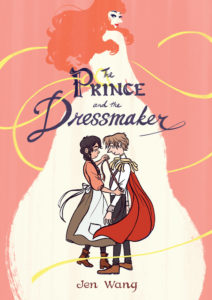Cautiously Optimistic
I’ll be honest, I’m of at least two minds about this:
“Our next movie musical project is with Marc Platt and it is a musical version of a graphic novel called The Prince And The Dressmaker.”
The team is working with Pulitzer Prize finalist Amy Herzog (4000 Miles) to adapt the graphic novel by Jen Wang.
That from Kristen and Bobby Lopez, who you may know from a catchy tunes that they’ve penned. My thought processes run roughly in the following directions:
- Curiously, I haven’t seen anywhere if this will be animated or live action. Not important, just something I noticed. Moving on.
- When paired with the right material, Jen Wang is one of the finest graphic novelists working today. Koko Be Good remains one of my all-time favorites, and last year’s Stargazing deserved all of the near-universal acclaim it’s received.
But, like any graphic novelist, masterful visual representation can only do so much when paired to a meh story (like her adaptation of Cory Doctorow’s In Real Life), and cannot make up for a story with severe structural problems.
- I am on the record (and pretty much alone) in saying that The Prince And The Dressmaker is in the latter category¹. As a fairytale, it’s at the extreme Walt end of the spectrum that runs from Cautionary Tale to Disney Fluff, treating those who most need to comfort of the story to an implausibly optimistic promise of how awesome life is.
- Then again, the Lopezes have worked on projects that have a bit more growl and earned heart to them; the protagonist of Coco has to struggle harder against a worse outcome than Prince Sebastian ever did², and the big I Want song in Frozen — the biggest every kid knows it song of the decade — went to the antagonist. These are not folks that keep too-neat resolutions in their creative toolbox.
And that’s before you consider that Bobby Lopez was also a co-creator of Avenue Q and The Book Of Mormon, two musicals that and know how to balance optimism with the crappy end of life. If the Lopezes come up with even one moment with half the emotional wallop as There’s A Fine, Fine Line, the adaptation could resolve one of my biggest problems with the graphic novel³.
So as I said up top, cautiously optimistic; if anybody can produce an adaptation that makes me re-evaluate my stance, it’s the Lopezes.
Spam of the day:
Our licensed health insurance agents have helped tens of thousands of Americans work through Medicare over the years, and now that expertise is available to you in one convenient publication.
Godsdammit, I am not old enough for Medicare. Buy better lists of marks for your bullshit, spammers!
_______________
¹ Although, too be fair, the absolute critical flaw has been corrected, so you don’t have to wrestle with crimes against humanity being adjacent to a story about gender expression and acceptance. Respect to Wang, editor Calista Brill, and everybody at :01 Books for recognizing and owning the mistake and fixing it in subsequent printings.
² In comparing the travails that I’m-not-a-princess Moana or Miguel compared to those of Sebastian, I am reminded of the old Simpsons gag, Marge, I’m asking for white-hot rage and you’re giving me a hissy fit.
³ The other I’m less hopeful about — I didn’t have room to address this in the original review and only hinted at it in the alt-text of the header image, but the book was mis-titled. Given the relative number of pages each gets the respective character journeys, it should have been called The Dressmaker And The Prince. Alas, the Playbill story describes the book as:
Set in Paris, the story follows Prince Sebastian, whose parents are scouring the country for a bride for their son. But Sebastian leads a secret life. By night, he dons spectacular dresses and goes out as Lady Crystallia, a Parisian fashion icon. His best friend, dressmaker Frances, is the only one who knows the truth, and she doesn’t want the credit for her creations to be secret anymore.
Frances should be the center of the story, but the title reduces her to afterthought, and I fear the focus will go entirely to Sebastian. Frances struggles, achieves, loses, and re-estabishes herself based on her skill and determination. Sebastian is indulged, privileged, briefly inconvenienced, and returned to his rightful place of high-born status. His is a character journey on a glass-smooth autobahn with a traffic bump at the end.

The above comments are owned by whoever posted them. The staff of Fleen are not responsible for them in any way.